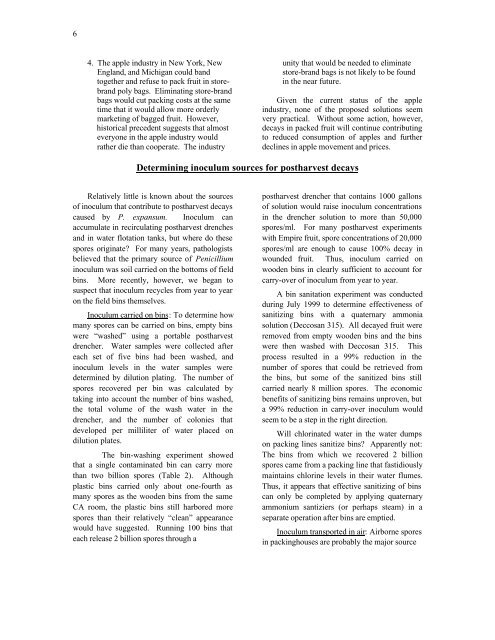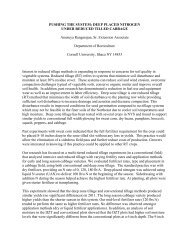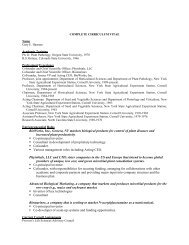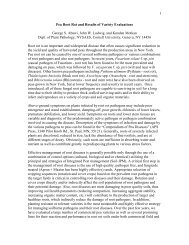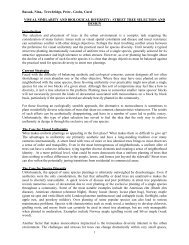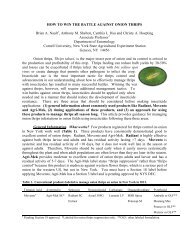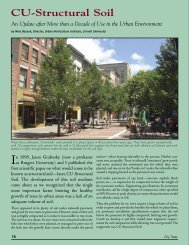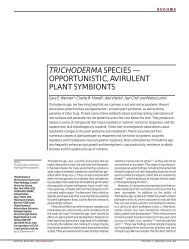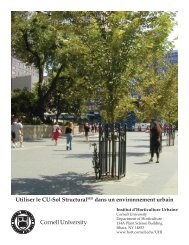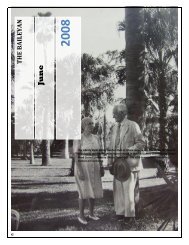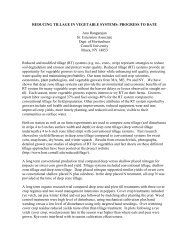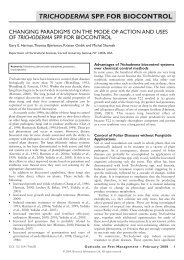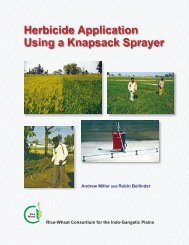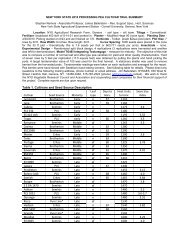Printer friendly .pdf file - Horticulture - Cornell University
Printer friendly .pdf file - Horticulture - Cornell University
Printer friendly .pdf file - Horticulture - Cornell University
Create successful ePaper yourself
Turn your PDF publications into a flip-book with our unique Google optimized e-Paper software.
64. The apple industry in New York, NewEngland, and Michigan could bandtogether and refuse to pack fruit in storebrandpoly bags. Eliminating store-brandbags would cut packing costs at the sametime that it would allow more orderlymarketing of bagged fruit. However,historical precedent suggests that almosteveryone in the apple industry wouldrather die than cooperate. The industryunity that would be needed to eliminatestore-brand bags is not likely to be foundin the near future.Given the current status of the appleindustry, none of the proposed solutions seemvery practical. Without some action, however,decays in packed fruit will continue contributingto reduced consumption of apples and furtherdeclines in apple movement and prices.Determining inoculum sources for postharvest decaysRelatively little is known about the sourcesof inoculum that contribute to postharvest decayscaused by P. expansum. Inoculum canaccumulate in recirculating postharvest drenchesand in water flotation tanks, but where do thesespores originate? For many years, pathologistsbelieved that the primary source of Penicilliuminoculum was soil carried on the bottoms of fieldbins. More recently, however, we began tosuspect that inoculum recycles from year to yearon the field bins themselves.Inoculum carried on bins: To determine howmany spores can be carried on bins, empty binswere “washed” using a portable postharvestdrencher. Water samples were collected aftereach set of five bins had been washed, andinoculum levels in the water samples weredetermined by dilution plating. The number ofspores recovered per bin was calculated bytaking into account the number of bins washed,the total volume of the wash water in thedrencher, and the number of colonies thatdeveloped per milliliter of water placed ondilution plates.The bin-washing experiment showedthat a single contaminated bin can carry morethan two billion spores (Table 2). Althoughplastic bins carried only about one-fourth asmany spores as the wooden bins from the sameCA room, the plastic bins still harbored morespores than their relatively “clean” appearancewould have suggested. Running 100 bins thateach release 2 billion spores through apostharvest drencher that contains 1000 gallonsof solution would raise inoculum concentrationsin the drencher solution to more than 50,000spores/ml. For many postharvest experimentswith Empire fruit, spore concentrations of 20,000spores/ml are enough to cause 100% decay inwounded fruit. Thus, inoculum carried onwooden bins in clearly sufficient to account forcarry-over of inoculum from year to year.A bin sanitation experiment was conductedduring July 1999 to determine effectiveness ofsanitizing bins with a quaternary ammoniasolution (Deccosan 315). All decayed fruit wereremoved from empty wooden bins and the binswere then washed with Deccosan 315. Thisprocess resulted in a 99% reduction in thenumber of spores that could be retrieved fromthe bins, but some of the sanitized bins stillcarried nearly 8 million spores. The economicbenefits of sanitizing bins remains unproven, buta 99% reduction in carry-over inoculum wouldseem to be a step in the right direction.Will chlorinated water in the water dumpson packing lines sanitize bins? Apparently not:The bins from which we recovered 2 billionspores came from a packing line that fastidiouslymaintains chlorine levels in their water flumes.Thus, it appears that effective sanitizing of binscan only be completed by applying quaternaryammonium santiziers (or perhaps steam) in aseparate operation after bins are emptied.Inoculum transported in air: Airborne sporesin packinghouses are probably the major source


